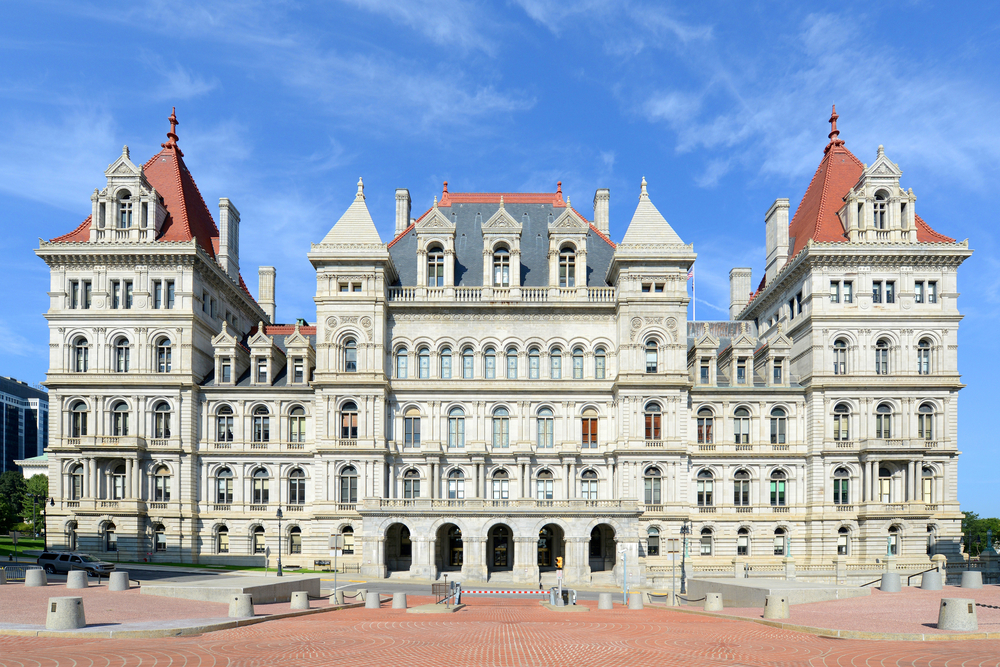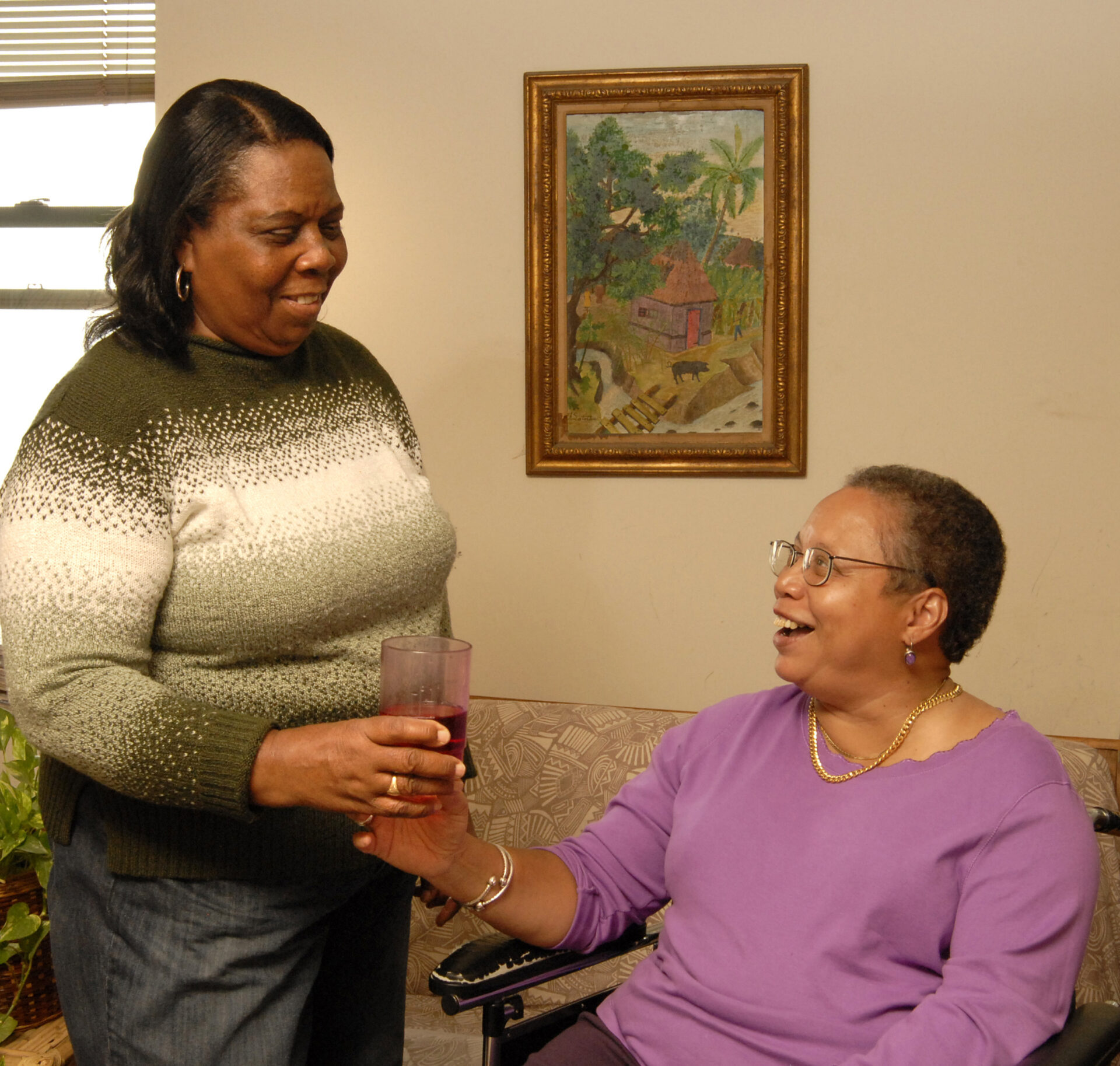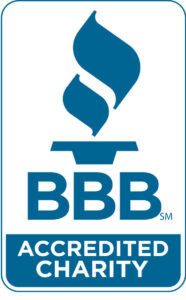March 19, 2024 —Recently, Funmi Akinnawonu, Senior Policy Analyst, and Julia Casey, Policy Analyst, sat down to discuss the New York State budget, including what’s at stake this year for New Yorkers in need.
Earlier this year, FPWA submitted testimony to the New York State Legislature for the 2024 Joint Legislative Budget Hearing on Human Services. Why was it important to do that?
This is a critical time for the state, as so many New Yorkers continue to struggle every day just to get by. Right now, nearly two out of five households are struggling to afford just the basics: paying rent, feeding their families, and affording child care. That’s nearly 40% of New Yorkers. It’s a staggering level of economic deprivation that should concern us all. And due to sexism and racism, economic deprivation is more acutely experienced by women of color. So the state budget is an opportunity to begin to turn this around and make meaningful, long-overdue investments in communities. Submitting testimony is also an opportunity to contextualize these interrelated struggles and put the government on notice that we are here to hold them accountable.
Tell us about what some of those investments would look like.
In our testimony, we first talk about the importance of improving income supports such as cash assistance and SNAP. These are programs that are already providing critical aid to New Yorkers, and they work. For example, research shows that recipients of direct cash experience improvements in their physical and mental health, and cash has also been shown to reduce violent crime, domestic violence, and child maltreatment. SNAP helps improve food security and support physical, intellectual, and emotional health, and it is linked to improved educational attainment and higher rates of school completion. SNAP also stimulates local economies, lifting up the whole community in the process. In other words, all of us benefit from these programs.
That’s why we advocate for bills to increase cash assistance and raise the minimum SNAP benefit. But beyond cash and food assistance, we know that two of the biggest costs New Yorkers face are child care and housing. That’s why we also advocate for a number of policies to not only enhance access to quality, affordable child care, but also to finally compensate the workforce appropriately by creating a permanent state fund to provide compensation supplements for child care workers.
We then addressed the housing inventory and affordability crisis and the need to establish a right to counsel in housing eviction proceedings. We know that more than half of all renters in New York State are rent burdened—meaning they pay more than 30% of their income on rent—and the construction of new housing has not kept up with demand. That is why we advocate for a new state-funded rental assistance program, the Housing Access Voucher Program, and support from the state for the 5 Borough Housing Movement, which will incentivize the development of additional housing construction projects including affordable housing units.
We are also concerned about the lack of due process in housing courts around the state. We know in many locales, virtually no tenants are represented while almost all landlords are represented in eviction proceeding. We support the passage of a bill codifying the right to counsel and allocate $260 million in funding. We’ve already seen how impactful access to counsel in eviction proceedings can be, based on the data from the Universal Representation Program in New York City. We know that tenants who are represented by an attorney are less likely to receive an eviction warrant or to ultimately be evicted.
There is a similar due process issue playing out in immigration deportation proceedings. We also need a commitment from the state to support immigrants by establishing a right to counsel in immigration deportation proceedings and allocating $150 million to fund the New York State Office for New Americans. The New York City Comptroller, Brad Lander, just published a reporting discussing how passing the Access to Representation Act and investing in immigration legal services is an investment in New York’s economy, highlighting an earning potential of $470 million for newly arrived migrants. Finally, we advocate for raising wages not just for child care workers, but also for the human services sector and home care workers.
Of the recommendations you make in the testimony, which is most critical and why?
Because so many New Yorkers are facing homelessness, food insecurity, and lack access to basic needs and supports like child care, those investments are most urgent. But it is critical that we don’t lose sight of the long-term solutions that will finally address the structural issues that keep so many New Yorkers in a cycle of economic deprivation. New Yorkers deserve to live with dignity, and that means more than just having enough income to meet basic needs. That’s why we continue to talk about using comprehensive measures of need to determine eligibility for income supports, while also increasing wages and moving toward more universal programs. And in addition to this, it is fundamental that economic policy and advocacy center on building wealth as the ultimate solution to generating prosperity and preventing deprivation. Other systemic changes, such as accurately measuring the true cost of living, must also be made to fundamentally shift the underlying economic conditions of millions of New Yorkers.
What’s at stake if your recommendations are not implemented?
So much is at stake. Without these investments, economic deprivation will only worsen. More New Yorkers will go without food and other essentials. More New Yorkers will end up homeless, face eviction, or enter the shelter system because they can’t afford rent. More New Yorkers will leave the workforce because they can’t access child care. More families will be separated by our immigration system, removing breadwinners and caretakers from homes and communities. Those on the front lines – human services workers, home care works, child care workers – will continue to be overworked, undervalued, and underpaid. We also know that these are racial and gender equity issues, too. People of color and women experience this economic deprivation most acutely, and interlocking systems of racism and sexism make the inequities even more pronounced for women of color. So these inequities will worsen if we don’t act.
What’s next?
The State Assembly and Senate released their “One-House” budgets, which then is negotiated alongside Governor Hochul’s budget. Funding for some of these policies was included – a partial increase in the cash assistance grant, a new expanded Working Families Tax Credit that we discuss in our testimony, a 3.2% COLA for human services workers, and the Housing Access Voucher Program (HAVP). We’ll continue our advocacy to ensure that policies like these make it in the final budget.
Once the final budget is adopted, we’ll assess where the budget makes progress, and where it falls short. If there are certain pieces of legislation that can get passed in the remainder of the legislative session, we’ll continue the fight, then begin strategizing for next year. We’re also continuing our advocacy at the city level to make meaningful investments in the city budget as well.
At FPWA, we will not only continue working on these issues, but we’re also continuing to work on tackling some of the structural issues the perpetuate and exacerbate some of these inequities. This includes changing the narrative around cash assistance through our Story Collection Series to address some of the stigma and racism in the benefits system, doing a deep analysis of the systems that cause the greatest harm to low and middle income New Yorkers, exploring more robust income supports like Guaranteed Income, and continuing to advocate for a true cost of living that measures what it takes for New Yorkers to live with dignity.
###





